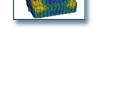 |

Plenary Speakers
|
|

Dislocations 2000: Description
June 19-22, 2000
NIST, Gaithersburg, Maryland, USA
Interest in the fundamentals of plastic
deformation has been increasing dramatically
over the past several years, in pure metals and alloys as well
as in non-metallic systems. Much of the recent work involves exciting
new approaches to this old problem including large-scale
3D atomistic and mesoscopic computer
simulations, a variety of new experimental techniques, and the application
of several modern statistical physics approaches. This work is occurring
in many countries, but full international communication has
been lacking. A focussed international conference will bring these
diverse communities together.
SCOPE:
Driven by the development of new theoretical, computational,
and experimental techniques, the fundamental science of plastic
deformation is undergoing a renaissance, just in time for the next century.
Whereas the 20th century witnessed the development of dislocation
theory, the 21st century should see the bridging of length and time
scales from the atomic structure of dislocations to continuum plasticity.
The Dislocations 2000 Conference is therefore occurring at a pivotal
moment, and it will serve as a launching point for the next century
of research in this field. The SCOPE of this conference is
simply stated: fundamental research on dislocations in all types
of materials and their role in plasticity.
TOPICS:
This topic list is just one possible categorization of current
fundamental research on dislocations and plasticity. A final
list of topics for the conference will be decided upon after
the abstracts have been received.
- Experimental Techniques and Observations
- Atomic Scale
(Core Structure, Dynamics, Interactions,
Experiments...)
- Mesoscopic and Multiscale
(Dislocation Dynamics, Modeling, Theory,
Experiments...)
- Nonlinear and Statistical Approaches
(Patterning, Transport, Deterministic &
Stochastic Models...)
- Size Effects and Strain Gradients
- Dislocation-Interface Interactions
- Non-crystalline "Dislocations"
(Amorphous Materials, Quasicrystals, ...)
FORMAT:
4 days
No parallel sessions
Plenary Speakers chosen by D2000 Executive Committee
Invited Speakers selected from the submitted abstracts
Poster Sessions
Organized Discussion Periods
LANGUAGE:
All talks, abstracts, and proceedings papers must be in
English.
|
|




